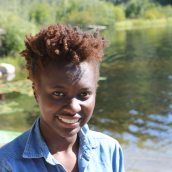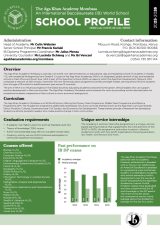Mirabelle Arodi (Class of 2012): Working Towards a Healthier Future
Indeed, the importance of these values to Mirabelle Arodi is obvious in her actions after graduation from the Academy.
Moving from Nairobi to join the residential programme at the Academy in Mombasa, Mirabelle Arodi has come leaps and bounds. She was one of many students at the Academy on financial aid and reiterates her gratefulness for the access it gave her to an excellent education. She joined the AKA Mombasa community in September 2010 and graduated in 2012. She was also awarded a full scholarship at The University of British Columbia (UBC) in Canada and is studying for a Bachelor of Science in Medical Biochemistry. She has had a very eventful university career so far, and hopes to graduate with her degree in the summer of 2016.
While at university, she has worked as a residence advisor for two years now, building a community and running different events and programmes to help enrich student’s experiences while living in residence. Her own experience as a residential student at the Academy has allowed her to fulfil her responsibilities even more effectively.
“The weekly activities such as family dinners and Saturday night activities also stimulated me intellectually and allowed me to interact with students of all ages and backgrounds, which made the experience of living in residence all the more enriching," she recounts. "This is something that I strive to create as a residence advisor here in university.”
She has also worked as a research assistant with two different professors: one, as a lab assistant in a Biological Solutions in Engineering research project, and another for economics-based solutions to water systems in British Columbia. This past year, she was also part of the planning committee for the 7th UBC Okanagan Student Leadership Conference, which was attended by over 200 university and high school students. In addition, last year she was able to attend the Berkeley Model United Nations Conference as a delegate representing UBC Okanagan. This year, she is part of the executive committee for the UBC Okanagan Model United Nations Club (UBCO MUN), in which she helped train delegates for an external international conference, organised a football tournament for over 100 people and is currently helping to organise the UBCO MUN Conference in late January. In the future, Mirabelle hopes to go to medical school and eventually return to Kenya where she intends to work in public health and raise the standards of healthcare.
Mirabelle also valued the advice she got at the Academy in terms of preparing her for life in university and beyond.
“I definitely had excellent university counselling at the Academy and was able to get my first choice of university. The process was made very easy and smooth by the structure of weekly university counselling sessions in which I was able to perfect my personal essays. In addition, the availability of the counsellors, even outside of school hours, was a huge help and I was able to get constant support and feedback. The willingness of other teachers as well, not just counsellors, to help in the university applications was much appreciated.”
But Mirabelle valued her experience at the Academy for more than just getting her to university.
“The Academy definitely enhanced my intercultural fluency, which has been very valuable in interacting with the diverse student and staff population at university. Its emphasis on being well-rounded also helped me to pursue different interests other than just academics. In addition, the discipline that the Academy instilled in me has enabled me to keep on track at university and not be overwhelmed by the freedom that university offers. This gave me an advantage over other schools that my peers attended; they had more of a hard time adjusting and finding their footing.”
She also reflects on the way her time at the Academy affected the way she lives her life outside the academic sphere.
“I think one of the most important values that the Academy instilled in me is critical thinking. My peers often ask me why I ask so many questions about everything and I believe this is a testament to the Academy encouraging critical thinking not only in academics through theory of knowledge [a mandatory multidisciplinary course taken by all students in the Diploma Programme], for instance, but also through involvement in other extracurricular activities. I believe that always reflecting and analysing has helped me narrow down the interests I pursue in university because I am able to discern why I am doing what I am doing and how it will impact me and those around me. In doing so, I am able to get as much meaning and value out of every activity that I pursue.”
Mirabelle is still actively involved in the local community at the UBC Okanagan campus.
“I am currently taking on a legacy project that has been going on at the university for the past three years. It is a cultural fashion show in which we have students model and represent clothing from different countries in the world, as well as entertainment in the form of dances, for example, from different countries. The show is a fundraiser and this year we will be supporting local charities in the Okanagan. In doing so, we will be more engaged with the surrounding community and be able to tangibly see the effects of our fundraising efforts.”
When looking back on her choice to pursue the International Baccalaureate (IB) Diploma Programme, she recognises the value it brought to her academic capability and how it set her apart from her peers who came from different systems.
“I highly value the IB curriculum and completely credit it with me being where I am now; at a well-renowned university on a full scholarship, excelling in both academic and extra-curricular activities. The IB was definitely very challenging, and the workload prepared me very well to handle the first and second years of university. My peers did not find it as easy to meet the academic demands of school. In addition, the IB helped me balance school work while still being actively engaged in extracurricular activities which has been very valuable in enriching my university experience so far. Lastly, the course content of the IB is at a very high level, which enabled me to better understand university courses and in some cases, allowed me to skip ahead and take more advanced courses in my first and second years.”
Her passion for excelling and engaging with issues that are important to her shows no signs of waning. She feels strongly about problems regarding the lack of adequate healthcare in particular.
“I believe that healthcare is incredibly important and should be a right rather than the privilege it is in some areas of less economically developed countries. If I had all the resources at my disposal, this is where I would focus; ensuring that medical care is easily accessible and affordable for all.”





